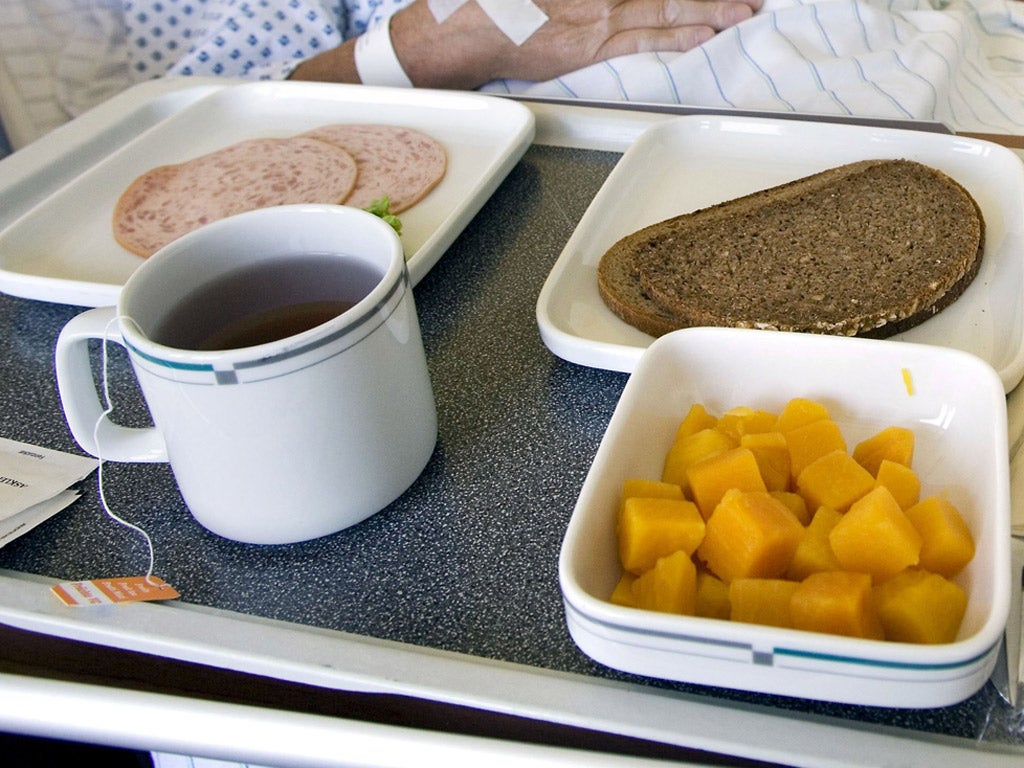Healthy eating? Hospital spends just £2.19 a day on patients' meals
Investigation launched after health figures reveal huge disparities across country

Dozens of hospitals trusts across the country are spending less than £5 a day on providing three meals for their patients, according to official statistics.
Figures, released by the Department of Health yesterday, showed some hospitals spending more than £15 on food per patient while others were working off budgets of less than a third of that.
The lowest spending hospital in the country appeared to be Newham University Hospital Trust which submitted figures of just £2.19 for feeding its patients a day – 1p less than the average cost of feeding a prisoner – while Gateshead NHS trust spent £2.94.
Great Ormond Street children's hospital told the Department of Health it spent £4.90 a day, just over half that of Sheffield Children's hospital which spent £8 a day. By contrast South Tees Hospital Trust appeared to be spending £15.47 per patient per day on food while Barts and the London spent £15.65. Jeremy Hunt, the Health Secretary, said the figures showed spending on food varied "wildly across the country" and announced an investigation into whether there was "a link between what is spent and the quality of food delivered".
"What's not clear is whether when the price drops, quality drops too," he said. "I want to find out if there is a link between what is spent and the quality of food delivered; and if not, why not."
But the department's figures were immediately questioned by the hospitals concerned who said that they did not accurately reflect the amount they spent on food.
Newham said its reported costs were based on the cost of one meal rather than three meals a day and their average cost per patient was actually £6.57 per day. Great Ormond Street also disputed its figures which, it said, it had reported inaccurately. It said the real figure was £7.64.
Meanwhile, the Hospital Caterers Association questioned the overall claim made by the department that the total amount spent on patient food in the NHS had risen from £8.77, from £8.58 last year.
They said the total average cost spent on food by NHS hospitals was actually around £3 per patient – with the rest of the money being spent on staff and other associated costs. They added that many hospitals rather than increasing spending were actually trying to make savings – at a time of rising wholesale costs. This, they said, could amount to as much as £1 m over a five-year period.
"Hospital caterers are under huge pressure to make efficiency saving on their food costs," said Janice Gillen, the organisation's chief executive. "But this is a mistake. Good food should be regarded as the simplest form of medicine and is critical to helping patients recover."
At the weekend Mr Hunt announced that teams of inspectors, half of whom would be patients, had started pilot inspections across the country looking at aspects of hospital food – including taste, quality, temperature, and the cleanliness of ward kitchens. Financial incentives for hospitals who deliver exceptional service were also being explored, he said.
The figures released yesterday were designed to back up the need for the inspections.
But the problems in those statistics will lead to concerns that the information being provided by hospitals is inaccurate – and insufficient checks are being done by the Department of Health before policy is formulated on the back of them. A Department of Health source said: "These are the figures that the hospital trust themselves submitted to the department. This is not a new exercise and we have no reason to question them."
Join our commenting forum
Join thought-provoking conversations, follow other Independent readers and see their replies
Comments
Bookmark popover
Removed from bookmarks